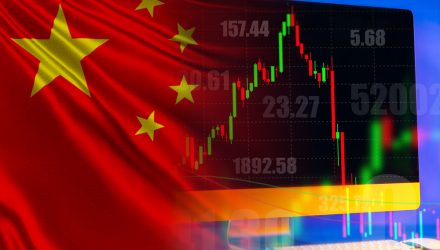Experienced emerging markets investors know that one of the keys to success when tapping equities in developing economies is often avoiding state-owned enterprises (SOEs) or those companies in which the government holds substantial stakes.
Over the long haul, emerging markets SOEs frequently subject investors to lower rates of growth, more geopolitical risk, and subpar returns relative to stocks without the “state-controlled” designation.
A variety of exchange traded funds help investors avoid SOEs. Investors looking to deploy that approach while focusing on Chinese consumer equities may want to evaluate the KraneShares CICC China Consumer Leaders Index ETF (KBUY). Like so many China-specific ETFs, KBUY isn’t perfect at the moment, but it checks the box of avoiding large SOE exposure, and that’s a positive in this environment.
“SOEs’ revenue rose 9.6% in Q3 2022 from Q3 2021, according to the report. This represents a slowdown in the trend after rising sharply at the start of 2021,” according to Moody’s Investors Service. “Profit before taxation declined by 0.5%, indicating continued weakness in profitability. In comparison with Q2 2022, on a quarter-on-quarter basis, revenue and profit before taxation declined 1.5% and 13.3% respectively.”
KBUY, which tracks the CICC China Consumer Leaders Index, is a mix of consumer staples and consumer discretionary companies. While the former sector is known as a slow-growth, low beta destination in the U.S., it offers favorable growth potential in China and is often free of direct interference from Beijing.
Speaking of the growth potential offered by KBUY and its member firms, it’s worth examining at a time when many Chinese SOEs are posting slack sales top line growth.
“Flat revenue growth and continued weakness in profitability in Q3 2022 compared to Q2 2022 also reflect the rise in infrastructure investment, which is being used as a key tool by the government for supporting growth. However, renewed COVID-19 outbreaks in a few large cities and ongoing property sector weakness have slowed the economic recovery,” added Moody’s.
By focusing on the Chinese consumer, KBUY is free of sectors, such as industrials and materials, that are vulnerable to cyclical shocks in both the Chinese and global economies.
“At the same time, metal mining companies are also likely to face higher mining costs because of rising labor costs amid inflation and COVID-19 restriction measures, as well as elevated energy costs,” concluded Moody’s.
For more news, information, and strategy, visit the China Insights Channel.
The opinions and forecasts expressed herein are solely those of Tom Lydon, and may not actually come to pass. Information on this site should not be used or construed as an offer to sell, a solicitation of an offer to buy, or a recommendation for any product.

